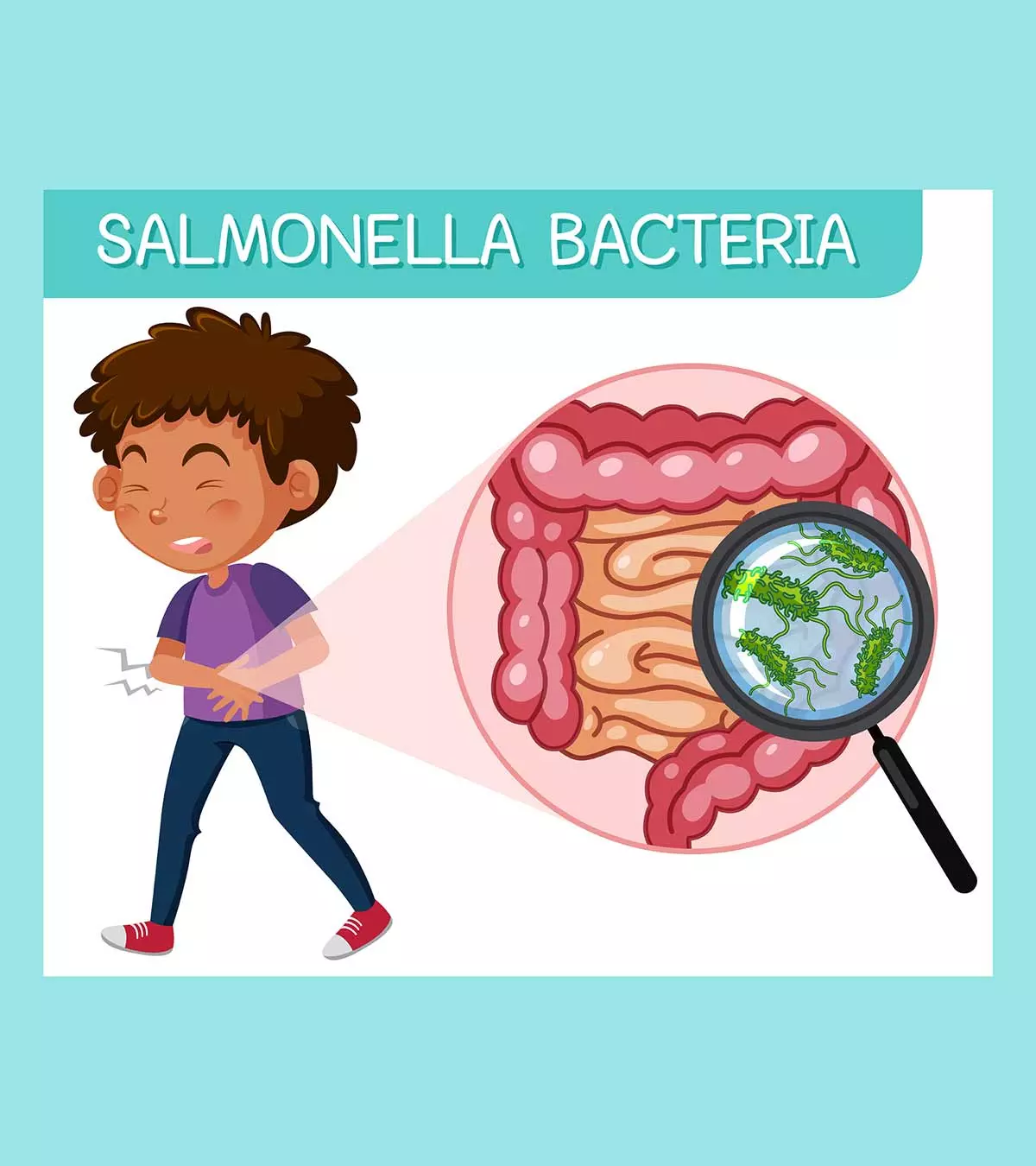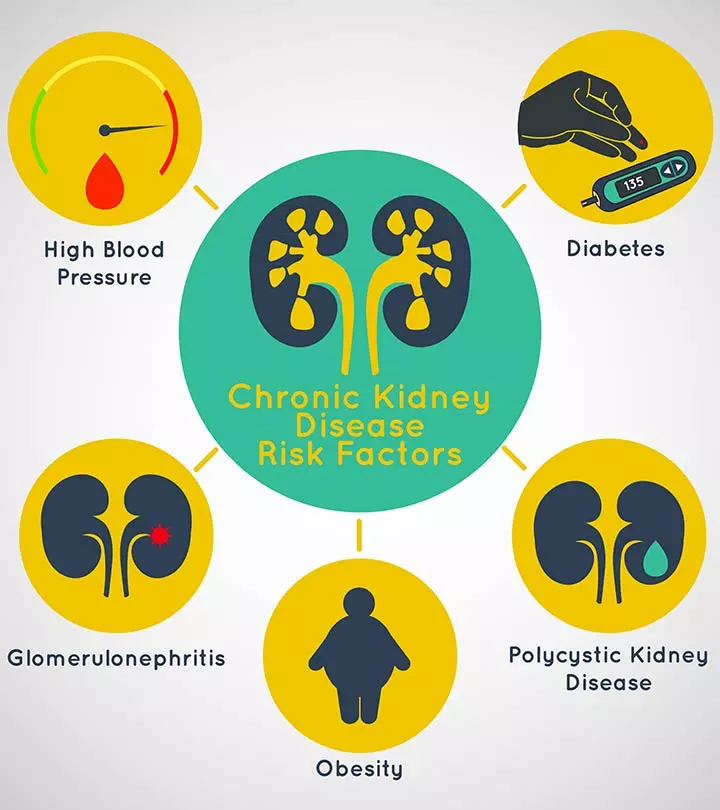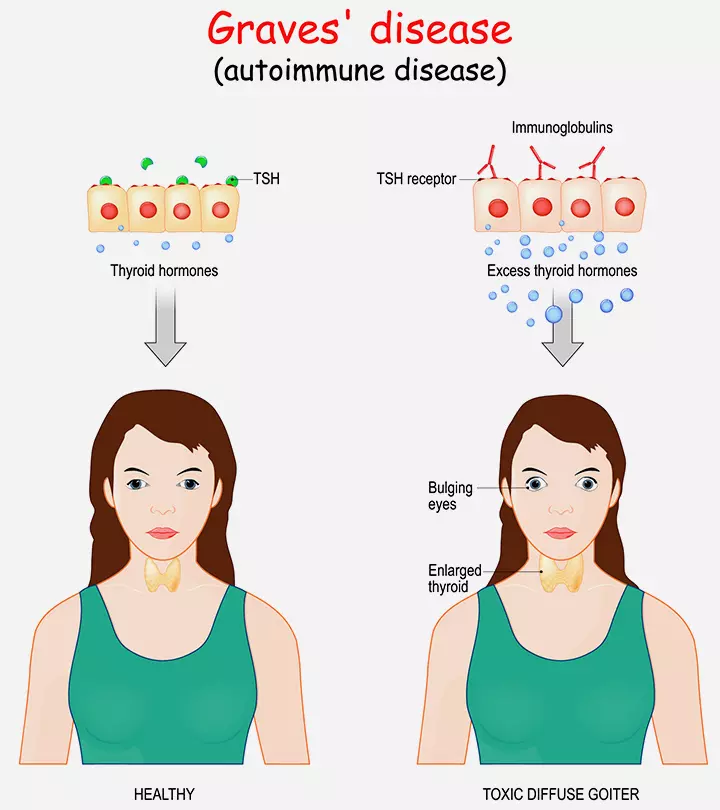
Image: Shutterstock
Graves’ disease in children is a chronic autoimmune condition, which means the child’s immune system causes the condition. Graves’ disease accounts for 10–15% of all endocrine and thyroid disorders in children and teens. According to the Children’s Hospital Of Philadelphia (CHOP), the condition affects about one in 10,000 children in the US. It is characterized by weight loss, increased heartbeat, fatigue, and other health issues that require long-term medical intervention (1) (2). It is also among the most common causes of hyperthyroidism in children.
Read this post to learn more about the causes, symptoms, diagnosis, and treatment modalities for Graves’ disease in children.
Key Pointers
- Graves’ disease in children may show a range of symptoms such as swelling around the neck, excess sweating, poor concentration, and protruding eyes.
- The notable risk factors for the condition include a family history of thyroid disorders, autoimmune conditions, and bacterial or viral infections.
- Physical examinations, blood tests, ultrasound, and radioactive iodine uptake scans help diagnose the disease.
- Antithyroid medications, radioactive iodine, and thyroidectomy may help treat the disease.
What Causes Graves’ Disease In Children?
The exact cause of Graves’ disease remains unclear, but it is believed that the disease is caused due to genetic and environmental factors
.
The pathophysiology of the disease is based on the binding of an antibody called thyroid-stimulating immunoglobulin (TSI) to the thyroid-stimulating hormone (TSH), signaling an increased synthesis of thyroid hormones, T3 and T4, and growth in the thyroid gland (overactive thyroid). It eventually leads to hyperthyroidism (3).
Studies suggest that alterations in several genes (the majority of them belonging to the HLA complex) increase a person’s overall risk of developing this disease (4). In addition, genes involved in thyroid function (thyroglobulin (Tg) or the thyroid-stimulating hormone receptor (TSHR) genes) and modification of immune responses (such as CD25, CD40, CTLA-4, and FOXP3 genes) are also linked to the development of Graves’ disease (5).
What Are The Risk Factors For Graves’ Disease?

Image: Shutterstock
Children are more at risk of developing Graves’ disease if they (6) (7):
- Have a family history of thyroid disorders
- Have a family history of autoimmune conditions
- Are female and are nearing puberty (puberty marks hormonal changes)
- Consume abnormal amounts of iodine through diet or medications
- Are subjected to chronic stress
- Have a history of viral or bacterial infections
- Have chromosomal abnormalities such as Down's syndromeiA genetic condition where a person has an extra chromosome apparent through facial features, and speech and language problems. or Turner syndromeiA genetic condition where one of the two x chromosomes in females is missing or underdeveloped.
- Have the habit of smoking
What Are The Symptoms Of Graves’ Disease In Children?

Image: Shutterstock
The symptoms of Graves’ disease may vary among children. However, the most common signs of this condition are (6) (7):
- Swelling around the neck
- Difficulty in swallowing
- Rapid heartbeats
- Increased blood pressure
- Trouble sleeping
- Weight loss, despite a good appetite due to an increased basal metabolism
- Excess sweating due to heat intolerance
- Shaking of hands and legs, nervousness
- Protruding eyes
- Chronic fatigue and weakness
- Hyperactivity and irritability
- Frequent mood swings
- Poor concentration and memory problems
- Hair loss, especially around the scalp
- Sensitivity to heat or cold
- Frequent urination and bedwetting
- Changes in menstrual cycle in girls
- Frequent feelings of being emotionally low, anxiety, depression, crying or yelling
- Slow growth rate, leading to short height and growth retardation
 Quick Fact
Quick FactThe symptoms of Graves’ disease may resemble other health conditions seen in children. Get a pediatric consultation if you notice any signs in your child for appropriate diagnosis and definite treatment.
How Is Graves’ Disease Diagnosed In A Child?

Image: Shutterstock
Experts suggest that a combination of physical examination, a detailed study of a patient’s history, and specific lab tests are essential for diagnosing Graves’ disease in children. Your child’s doctor may suggest the following tests (8).
- Physical examination: It helps detect signs of restlessness, tremors, palpitations, abnormal heart rates, bulging eyes, and blood pressure abnormalities.
- Blood tests: A series of blood tests are done to measure the levels of T3, T4, and thyroid-stimulating hormones. Additional blood tests may also be done to check the TSI antibody levels.
- Ultrasound: An ultrasound is used to detect an enlarged thyroid gland and increased blood circulation in the thyroid gland.
- Radioactive Iodine uptake scan: This is an additional test used when the lab tests and scan cannot confirm the diagnosis. The test helps in determining iodine absorption by the thyroid gland.
How Is Graves’ Disease In Children Treated?

Image: Shutterstock
The treatment for Graves’ disease in children will depend on the age, the severity of symptoms, medical history, and overall health status of the child. Your child’s doctor may consider the following treatment options (1).
- Antithyroid medications: Antithyroid drugs are used as initial treatment for Graves’ disease in children. Remission is achieved in most children after treatment with antithyroid drug therapy. These drugs are known to suppress the synthesis of thyroid hormones. The most commonly used drugs are carbimazole, propylthiouracil, and methimazole.
- Radioactive iodine: Radioactive iodine therapyiA treatment where radioactive capsules are ingested orally to destroy or shrink thyroid cells. is effective if your child has serious side effects from medicines. The low-dose iodine therapy aims at preventing the recurrence of Graves’ disease.
- Thyroidectomy: This is a surgery indicated in children who don’t respond to medications or radioactive iodine therapy. Surgery is an option only in serious cases as there is a possibility of acute to serious complications, such as hemorrhage, after the surgery.
 Things to know
Things to knowDiscuss with your child’s doctor the suitable therapy and the guidelines to follow while monitoring your child after treatment. Attend regular follow-ups to monitor your child’s thyroid levels and assess treatment side effects.
What Are The Complications Of Graves’ Disease?
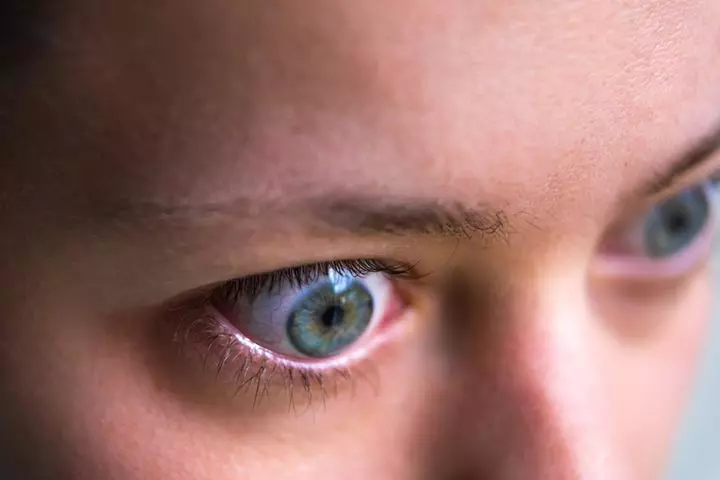
Image: Shutterstock
A common complication of Graves’ disease in children is Graves ophthalmopathy, a rare vision-threatening condition. In some cases, overexposure to certain treatment drugs may cause agranulocytosis, a rare bone marrow disorder leading to insufficient production of white blood cells. Untreated hyperthyroidism may lead to a rare but serious condition called thyroid storm, causing high fever and blood pressure (3) (7).
 Point to consider
Point to considerFrequently Asked Questions
1. Can Graves’ disease be cured in children?
Graves’ disease can’t be cured entirely. However, it can be managed with prompt medical treatment modalities, such as antithyroid medications and radioactive iodine therapy. The kind of treatment that will work for a child depends on several factors, such as age and the severity of their symptoms.
2. Does Graves’ disease shorten life expectancy?
Graves’ disease in itself isn’t life-threatening. However, lack of prompt treatment can cause several health complications that may affect life expectancy.
3. Are there any dietary considerations for children with Graves’ disease?
There are no specific dietary considerations, although avoiding refined foods with added sugars and caffeine is recommended. You may also add more protein, antioxidants, and calcium foods for kids to your child’s diet (9).
4. How can Graves disease in children be prevented?
Since the exact cause of Graves disease is not known, there are no known strategies to prevent this condition (10).
5. How often should children be screened for Graves’ disease, and at what age?
Generally, after the diagnosis, the treatment is started, and the thyroid hormone levels are checked monthly. After normalizing thyroid levels, the blood tests would be done once every two to three months. Furthermore, once the condition is under control, the child would be screened every six to 12 months (8).
Graves’ disease in children may be caused by genetic or environmental factors, and you may recognize the condition by swelling around the neck, increased heartbeat, and sleeping troubles. Doctors may be able to diagnose Graves’ disease with physical examinations, blood tests, and other diagnostic tests. Once the disease is confirmed, doctors may treat the child with antithyroid medications, radioactive iodine, or surgery. Although the treatment is effective, some children may complain of drug-based side effects. So, talk to your child’s pediatrician about your concerns and formulate a plan that helps manage the condition effectively.
Infographic: What Are The Risk Factors For Graves’ Disease?
Certain factors may increase a child’s risk of developing Graves’ disease, an autoimmune condition affecting the thyroid gland. Here is an infographic listing some such aspects. Identifying these risk factors and seeking medical attention if any symptoms arise in your child are essential to ensure timely and effective treatment.
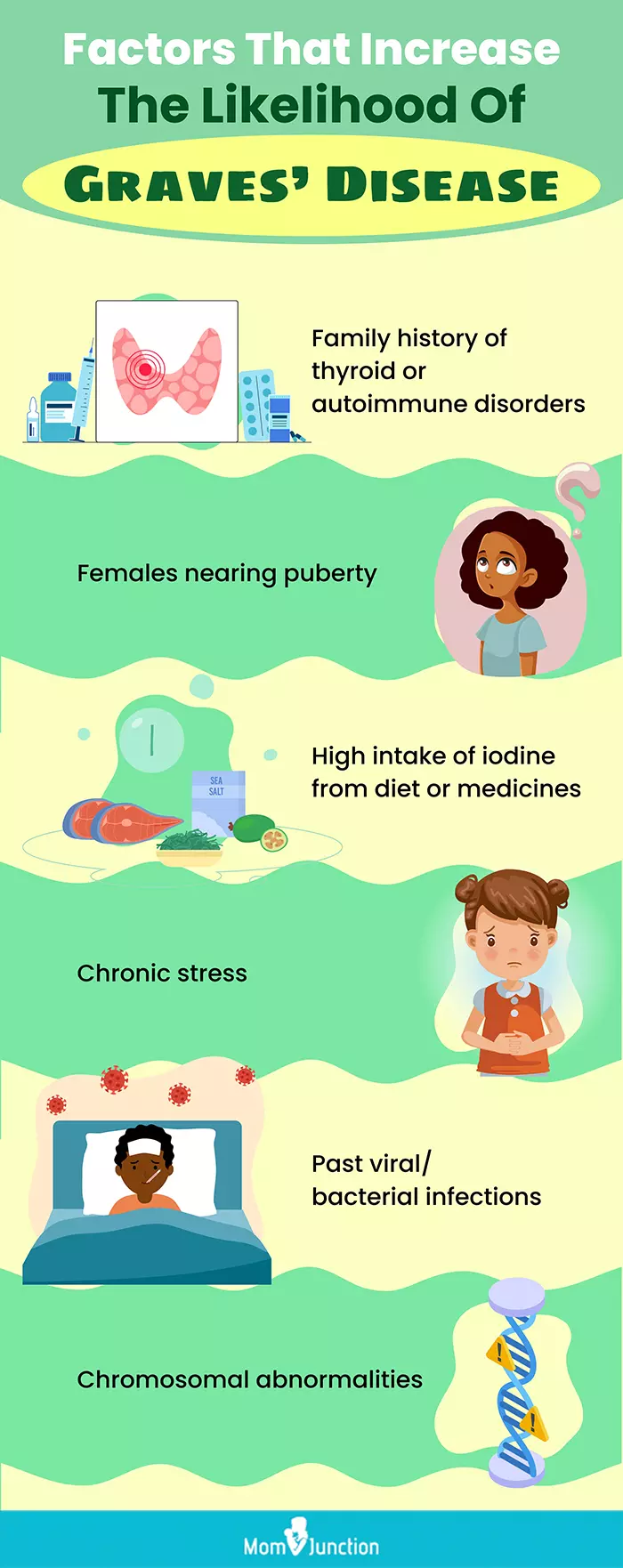
Illustration: Momjunction Design Team
Illustration: How To Diagnose And Treat Graves’ Disease In Children?
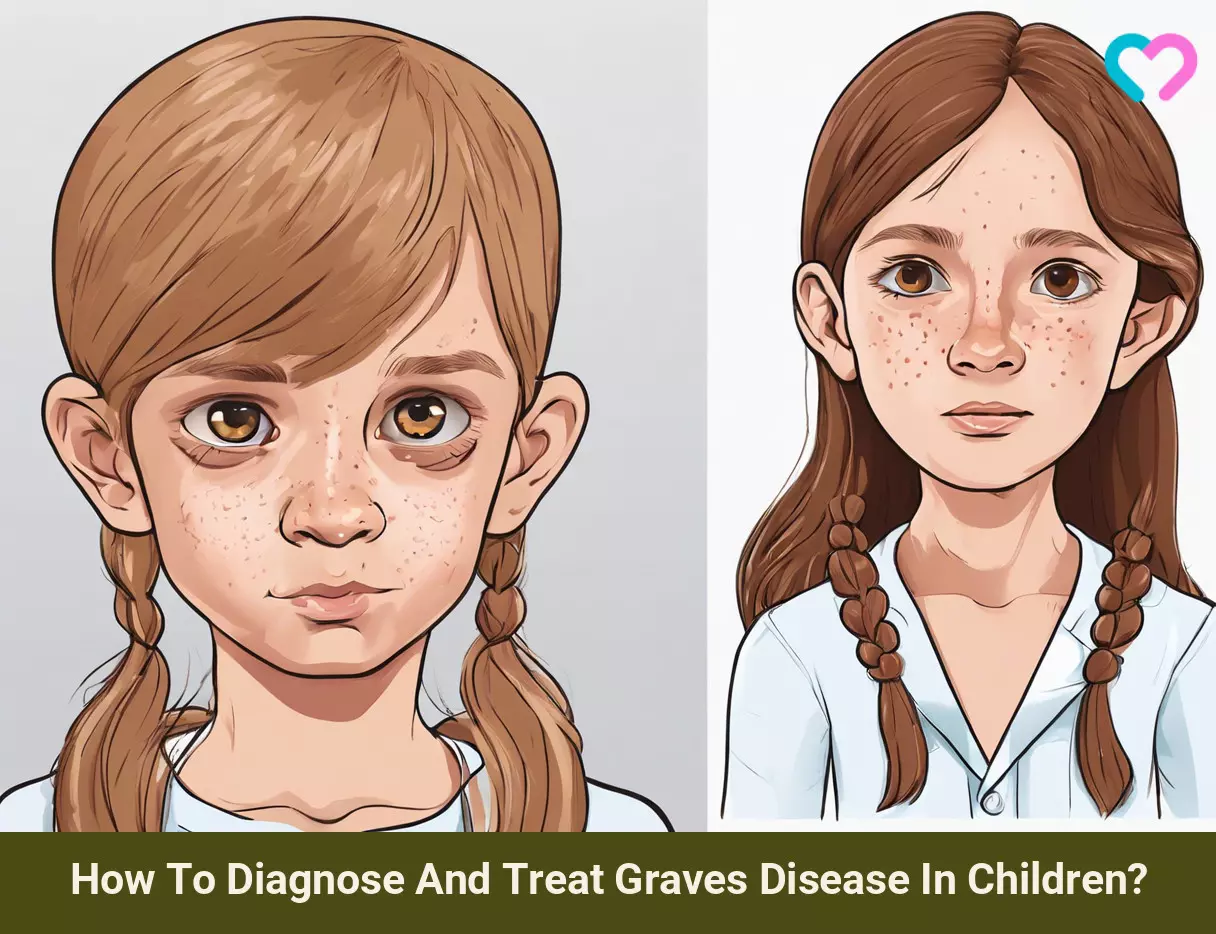
Image: Stable Diffusion/MomJunction Design Team
Learn about the medical management of Graves’ Disease in children and adolescents. Understand the treatments available and how to best manage the condition.
References
- Hae Sang Lee and Jin Soon Hwang (2014); The treatment of Graves’ disease in children and adolescents.
https://www.ncbi.nlm.nih.gov/pmc/articles/PMC4208256/ - Graves’ Disease in Children.
https://www.stanfordchildrens.org/en/topic/default?id=graves-disease-in-children-160-5 - Binod Pokhrel and Kamal Bhusal; Graves’ Disease.
https://www.ncbi.nlm.nih.gov/books/NBK448195/ - Graves’ disease.
https://medlineplus.gov/genetics/condition/graves-disease/#causes - Graves’ Disease.
https://rarediseases.org/rare-diseases/graves-disease/ - Graves’ Disease in Children.
https://www.urmc.rochester.edu/encyclopedia/content?contenttypeid=160&contentid=5 - Graves’ Disease.
https://www.nationwidechildrens.org/conditions/graves-disease - Mónica Ríos-Prego et al (2019); Relationship between thyroid dysfunction and body weight: a not so evident paradigm
https://www.ncbi.nlm.nih.gov/pmc/articles/PMC6711558/ - Graves disease and nutrition recommendations.
https://www.canr.msu.edu/news/graves_disease_and_nutrition_recommendations# - Grave’s Disease.
https://my.clevelandclinic.org/health/diseases/15244-graves-disease#
Community Experiences
Join the conversation and become a part of our nurturing community! Share your stories, experiences, and insights to connect with fellow parents.
Read full bio of Dr. Arva M Bhavnagarwala
Read full bio of Vidya Tadapatri
Read full bio of Dr. Ritika Shah
Read full bio of Dr. Joyani Das












